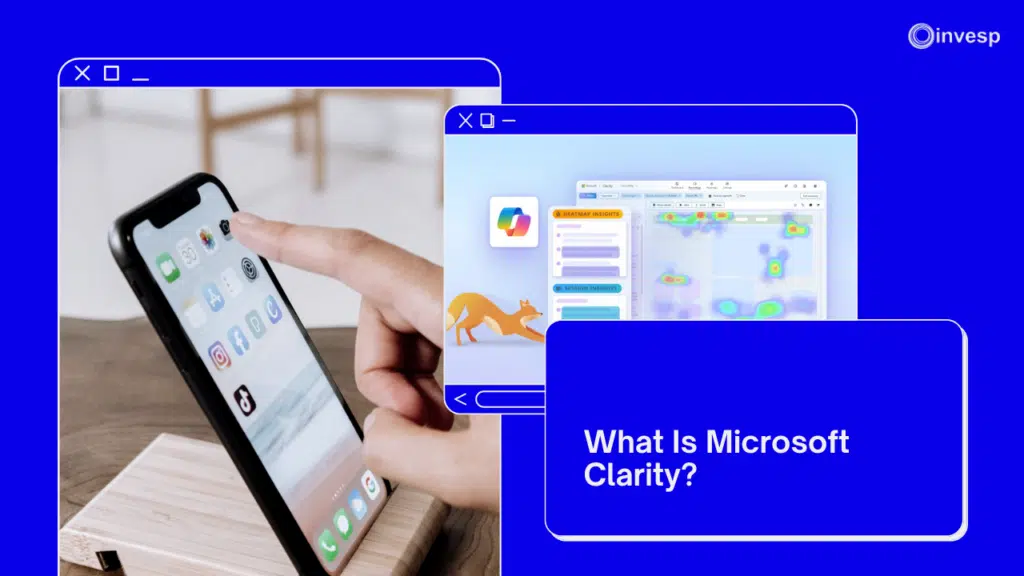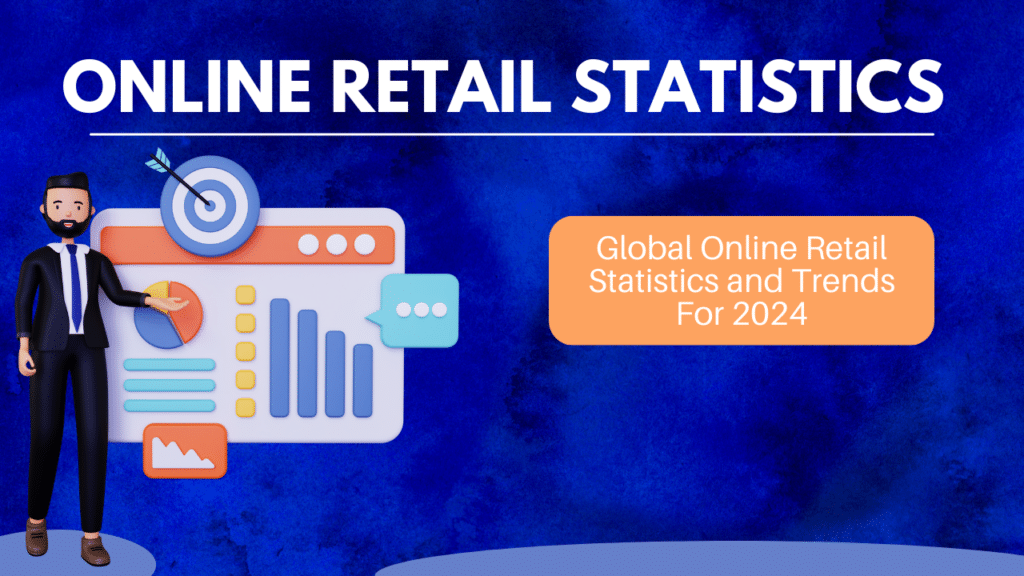AI Meets CRO: How Artificial Intelligence is Shaping Conversion Optimization
Imagine walking into a bookstore where every shelf you pass seems to have the exact book you’ve been looking for. The store knows exactly what you love to read—before you even realize it yourself. It’s like your favorite shopkeeper can predict your next purchase, offering suggestions that feel perfectly tailored to you.
Like that bookstore, AI allows websites to anticipate user preferences, fine-tune interactions, and optimize experiences in real time—all with one goal: improving conversions. By automating data collection, AI gathers relevant information efficiently, providing insightful analytics that enhance user experiences and drive better decision-making in Conversion Rate Optimization (CRO).
Whether it’s through personalized content, real-time adjustments, or predictive analytics, AI is helping businesses create unique and seamless customer journeys, ultimately boosting their bottom line. So, how does AI make this happen? Let’s discover.
Introduction to CRO and AI
Conversion Rate Optimization (CRO) is a crucial aspect of digital marketing that enables businesses to maximize their online performance by driving more conversions and revenue. With the advent of Artificial Intelligence (AI), a new era of optimization has emerged. AI-powered CRO uses machine learning algorithms to analyze large datasets and identify patterns, trends, and anomalies that human analysis might miss. By leveraging AI, businesses can optimize conversion funnels, refine messaging, and enhance user experiences to increase conversion rates.
Imagine having a digital assistant that can sift through mountains of data in seconds, uncovering insights that would take a human analyst days or even weeks to find. This is the power of AI in CRO. By using machine learning algorithms, AI can analyze user behavior across various touchpoints, predict future actions, and suggest real-time adjustments to improve conversion rates. Whether it’s personalizing content, optimizing call-to-action buttons, or refining marketing messages, AI helps businesses create a seamless and engaging user experience that drives conversions.
The Limitations of Traditional CRO Approaches
Traditional CRO approaches often involve manually analyzing data or reviewing complex dashboards and Excel sheets to gain insights into user behavior and identify potential areas for improvement. However, manual analysis can be time-consuming and susceptible to human bias. A/B testing is another commonly used method in CRO, but it is limited in its scope and reach. Conducting numerous A/B tests to explore various elements and combinations can be a time-intensive process, and it may not always yield statistically significant results. Traditional CRO approaches often require significant time and resources to execute effectively.
Think of traditional CRO as trying to solve a puzzle with only a few pieces at a time. You might eventually see the whole picture, but it takes a lot of time and effort. Manual data analysis and A/B testing can provide valuable insights, but they are often slow and limited in scope. Human analysts might miss subtle patterns or trends in user behavior, and running multiple A/B tests can be resource-intensive. This is where AI-powered CRO shines, offering a more efficient and comprehensive approach to optimization.
How Does AI Relate to Conversion Rate Optimization?
Imagine hosting a dinner party and wanting every guest to feel special. You know some like wine, others prefer sparkling water; some like their steak rare, others well-done.
If you could instantly read your guests’ preferences, adjust the menu on the fly, and make personalized suggestions, wouldn’t it make the experience much more enjoyable for everyone? Now, replace the dinner party with your website; those guests are your website visitors and potential customers.
This is where AI steps in for Conversion Rate Optimization (CRO)—helping businesses deliver personalized, optimized experiences that feel tailor-made, all based on real-time data.
Unlike traditional CRO methods, which rely on basic A/B testing and manual adjustments, AI goes beyond the surface, digging deep into patterns and behaviors to make smarter, real-time changes.
For instance, machine learning (a subset of AI) can analyze user data across multiple touchpoints—like where they click, what content they engage with, and how long they stay on a page—to predict what they might want next. This allows AI to suggest adjustments to the website, personalize offers, or even optimize a call to action (CTA) in real time.
AI also analyzes historical data to identify patterns and make data-driven decisions that enhance conversion rates.
Here are some ways AI can help you maximize your CRO efforts and boost conversion rates:
It helps you personalize your content. Brands can use AI-powered tools to deliver custom content based on visitor behavior. Platforms like Amazon and Netflix use AI to recommend products or shows based on what users like, which keeps them engaged and more likely to convert. You can do the same by offering personalized product recommendations or tailored experiences for your visitors.
AI helps automate A/B testing. AI can run multiple tests simultaneously to determine what works best for your audience, saving you time and improving conversion rates.
AI predicts user behavior. AI can predict what your visitors might do next—like if they’re about to abandon their cart or are ready to convert. You can use this data to trigger a discount or send a reminder, improving your chances of making a sale. For example, Spotify uses AI to suggest playlists, which keeps users returning.
It helps improve user experience. Personalization is the backbone of AI in CRO. Think of it this way: when browsing a website, you expect it to feel like it “gets you.” AI allows businesses to craft experiences that feel deeply personal.
Sephora, for example, uses AI to recommend beauty products based on a customer’s preferences, past purchases, and even skin type.

Sephora AI-based product recommendations
Their virtual artist tool leverages AI to help customers “try on” makeup virtually, improving the chances that they’ll convert and make a purchase.
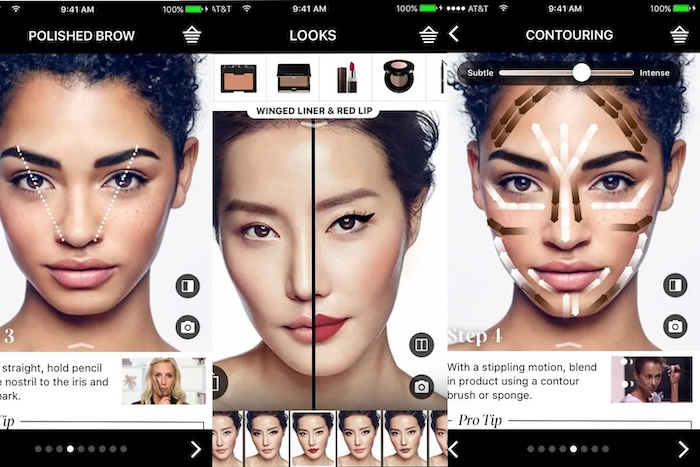
Sephora AI-based virtual makeup try-on tool for a better user experience (Source)
It’s not just about what AI can do for your business—it’s about what it can do for your customers. A personalized experience can make visitors feel more understood, valued, and likely to follow through with a purchase.
AI-Powered Tools for CRO
When it comes to CRO, having the right tools is like having a well-stocked toolbox for a home renovation project. That said, AI-powered tools are like a more sophisticated version of hammers and nails in this context—they allow you to identify what your audience wants and requires and fine-tune your website accordingly to boost conversion rates.
Here’s a breakdown of some powerful AI tools you can use to optimize your site for better user experience, personalized content, and, ultimately, more conversions.
1. Personalization Engines
Personalization is at the heart of CRO, and AI-powered personalization engines help you deliver tailored experiences for each visitor.
Integrating AI-powered personalization engines with Google Analytics can provide deeper insights into user behavior and improve content personalization.
How It Works: AI tools can analyze user behavior in real time, such as what pages they visit, what products they browse, and their past interactions with your site. Based on this data, they personalize the content users see, such as product recommendations or customized landing pages.
For example, OddBalls, one of the UK’s top underwear brands, uses AI Wishlist to display recently viewed items dynamically. After a visitor checks out at least three products, the AI creates a special onsite notification with tailored recommendations.
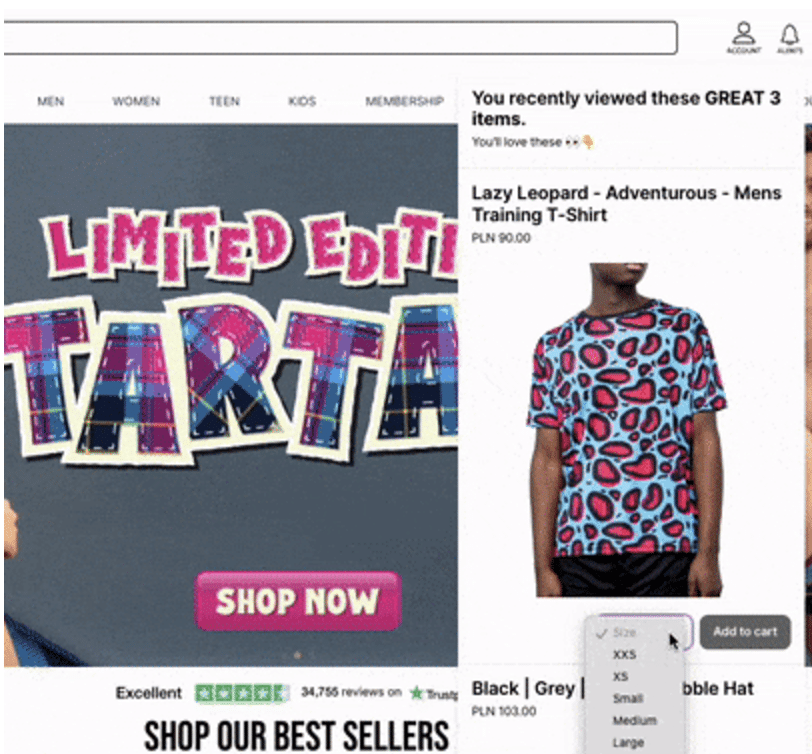
AI-based recommendations (Source)
This personalized nudge boosts engagement and encourages conversions by reminding customers of items they’ve shown interest in.
Pro tip: If you’re an e-commerce store, implement a personalization engine to show relevant products to each customer based on their browsing history. For a blog or content site, personalize articles or resources based on user behavior (e.g., show related articles based on what they’ve already read).
2. AI for A/B Testing
Traditional A/B testing is great, but AI takes it to the next level by running multiple variations and adjusting content in real-time. It’s like having a marketing team that runs experiments 24/7.
How It Works: AI tools like FigPii, for instance, use AI to provide personalized testing recommendations based on user behavior and preferences.
3. AI-Driven Chatbots
AI-powered chatbots are one of the easiest ways to engage users and guide them down the conversion funnel. These bots use natural language processing to understand user questions and provide instant responses.
How It Works: Tools like Intercom and Drift provide AI-driven chatbots that automatically answer customer questions, guide users through the buying process, and suggest products or services based on the user’s intent.
They’re available 24/7 and offer personalized customer support that mimics the human experience, which is impossible with regular, algorithm-driven chatbots.
Even governmental organizations are embracing AI chatbots. For example, Liverpool City Council implemented a virtual assistant to address common pain points in their digital channels.
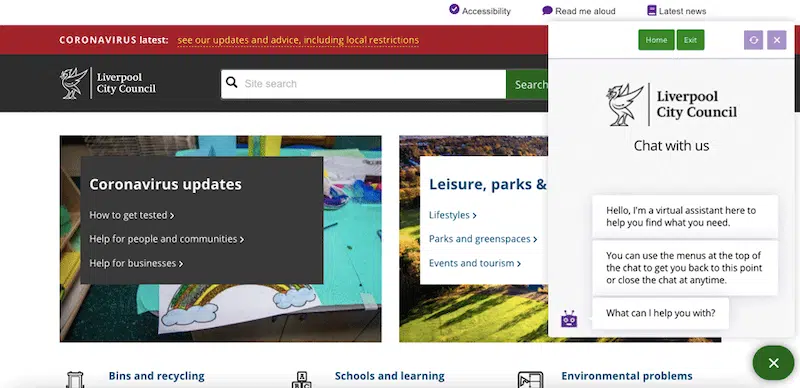
Liverpool City Council uses AI chatbot to address citizens’ queries (Source)
The bot helps citizens resolve queries about council tax and benefits in real-time, showing just how effective AI chatbots can be when it comes to replicating human-like customer support.
4. AI for Predictive Analytics
Predictive analytics uses AI to analyze past user behavior and predict future actions. It’s like having a crystal ball that helps you understand when a customer is about to leave your site or is ready to convert.
How It Works: AI tools like Pendo or HubSpot use machine learning to analyze data and predict outcomes. For instance, if a user has shown interest in a product but hasn’t yet made a purchase, the AI might indicate that they will likely abandon the cart. It can then trigger a remarketing campaign or a personalized discount to help close the sale.
AI-Powered Heatmaps to Analyze User Behavior
Heatmaps visually represent where users click, scroll, or spend time on your page. AI takes this further by analyzing the data and offering insights on optimizing those areas.
How It Works: Tools like FigPii or Crazy Egg use AI to generate heatmaps and analyze user interactions. They provide data on which sections of your pages attract the most attention and where users drop off. AI algorithms also suggest changes to improve user flow and increase conversions.
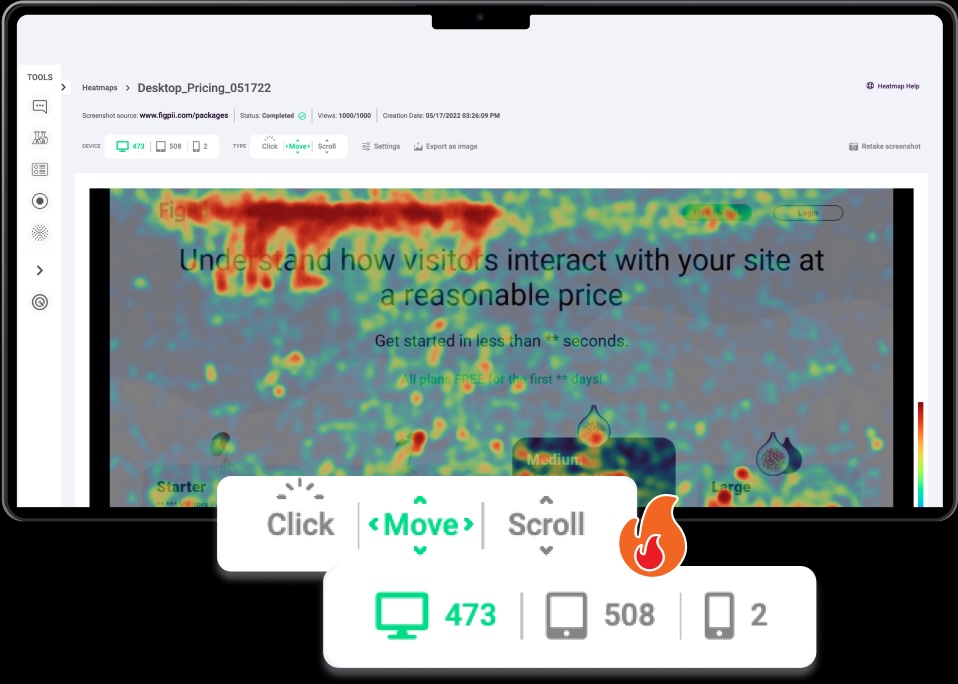
FigPii heatmaps showing how users behave on your site (Source)
6. Dynamic Content Optimization
AI can dynamically change content based on who’s visiting your site. This means you can display different banners, product offers, or even pricing based on user data, like location or past behavior.
Here’s an example of dynamic content where the brand uses it to change the user’s first name when they land on the site, making the experience more personal.
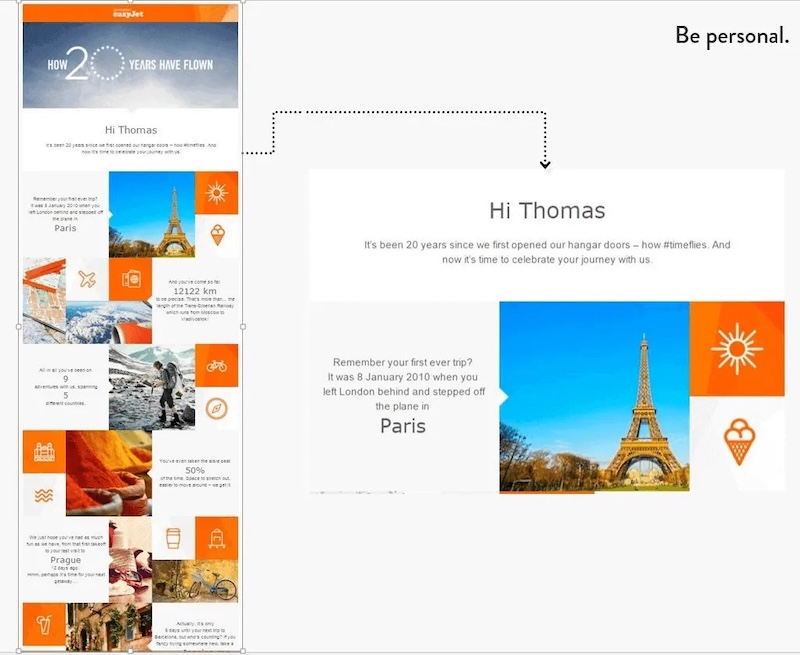
Dynamic content used for personalization (Source)
How It Works: AI tools like Unbounce or Convert allow you to show personalized content based on a user’s past interactions or demographic details. This creates a more engaging, relevant experience for the user, leading to higher chances of conversion.
Building a Data-Driven Optimization Culture
Embracing a data-driven culture of constant optimization is key to staying ahead of the curve. AI-powered CRO can help businesses optimize conversion rates with precision and efficiency. A data-driven culture can help businesses make informed decisions and allocate resources effectively. By leveraging AI, businesses can analyze large datasets, identify patterns, and make data-driven decisions to optimize their website and marketing campaigns.
Imagine having a team of data scientists working around the clock to analyze your website’s performance and suggest improvements. This is what AI brings to the table. By fostering a data-driven culture, businesses can continuously optimize their conversion rates and stay ahead of the competition. AI tools can analyze vast amounts of data in real-time, providing actionable insights that help businesses make informed decisions. This not only improves conversion rates but also enhances the overall user experience.
Identifying Opportunities for Improvement
AI-powered data analysis can identify patterns, trends, and anomalies that human analysis might miss. By analyzing user behavior data, businesses can identify areas for improvement and optimize their conversion funnels. AI can help businesses identify user drop-off points and target data-driven improvements. By leveraging AI, businesses can create a seamless experience that keeps users engaged and moving down the conversion funnel, boosting conversion rates.
Think of AI as a detective that can spot clues and patterns that are invisible to the naked eye. By analyzing user behavior data, AI can identify where users are dropping off in the conversion funnel and suggest targeted improvements. For example, if users are abandoning their carts at a specific point, AI can analyze the data to determine why and suggest changes to reduce drop-offs. This helps businesses create a more engaging and seamless user experience, ultimately boosting conversion rates.
Testing and Validation
AI-powered testing tools can accelerate the testing process by enabling multi-variant testing and real-time personalization. By leveraging AI, businesses can test multiple design variations at once, with AI adapting each one based on user behavior in real-time. AI can help businesses explore “what if” scenarios to help refine their strategies before making major changes. By leveraging AI, businesses can make data-driven decisions and optimize their conversion funnels with precision and efficiency.
Imagine being able to test multiple versions of your website simultaneously and see which one performs best in real-time. This is the power of AI in testing and validation. AI-powered tools can run multi-variant tests, analyzing user behavior to determine which design elements drive the most conversions. This allows businesses to make data-driven decisions and optimize their conversion funnels with precision. AI can also simulate “what if” scenarios, helping businesses refine their strategies before implementing major changes. This not only saves time and resources but also ensures that the changes made are based on solid data.
How AI Improves Data-Driven Decision Making
Imagine being a chess grandmaster who can see ten moves ahead. That’s what AI brings to businesses—clarity, foresight, and the power to act with precision.
Instead of relying on gut feelings or delayed reports, AI enables real-time decisions that keep you ahead of the competition.
Real-time data analysis and insights: AI analyzes data the moment it’s generated, highlighting trends or anomalies instantly. Take Domino’s Pizza as an example. Their Domino’s AnyWare system uses AI to track customer orders across platforms—apps, voice assistants, or even smart TVs—and analyzes real-time data to optimize delivery routes. The result? Faster deliveries and happier customers.
Predictive analytics for forecasting customer behavior: AI doesn’t just analyze—it forecasts. As we’ve seen above in this article how Sephora uses predictive analytics to anticipate customer needs and suggests products customers are likely to purchase next based on past behavior. This not only boosts sales but strengthens loyalty by making shoppers feel understood.
AI-driven precise targeting: Forget broad targeting—AI identifies micro-segments that drive better results. For example, Stitch Fix’s Outfit Creation Model (OCM) uses customer purchase history and current inventory to create personalized outfit suggestions, shared through emails, ads, and feeds. These hyper-relevant recommendations keep clients engaged and drive repeat business.
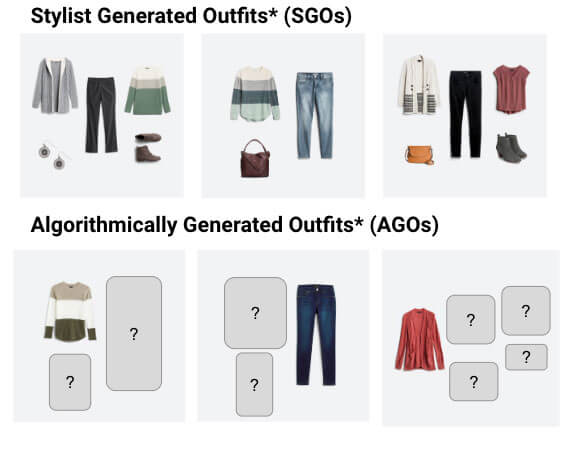
StichFix’s OCM model (Source)
Pro tip: Use AI to segment audiences by behavior or preferences and craft personalized campaigns that resonate with each group.
AI-Driven Personalization and User Experience
Say you walk into your favorite coffee shop, and the barista already knows your order. Now scale that level of personalization to millions of users online—this is how AI works to help you craft tailored experiences for your audience that make them feel valued.
Creating personalized journeys based on user behavior: AI creates personalized journeys by analyzing vast amounts of user behavior data, such as browsing history, search queries, time spent on pages, and purchase patterns. Machine learning algorithms then identify patterns, preferences, and intent to deliver content or offers tailored to each user.
Adaptive website design and content customization: Websites powered by AI adjust in real time to match user preferences. For instance, Spotify dynamically updates its homepage with playlists based on individual listening habits to keep users engaged and inspire customer loyalty.
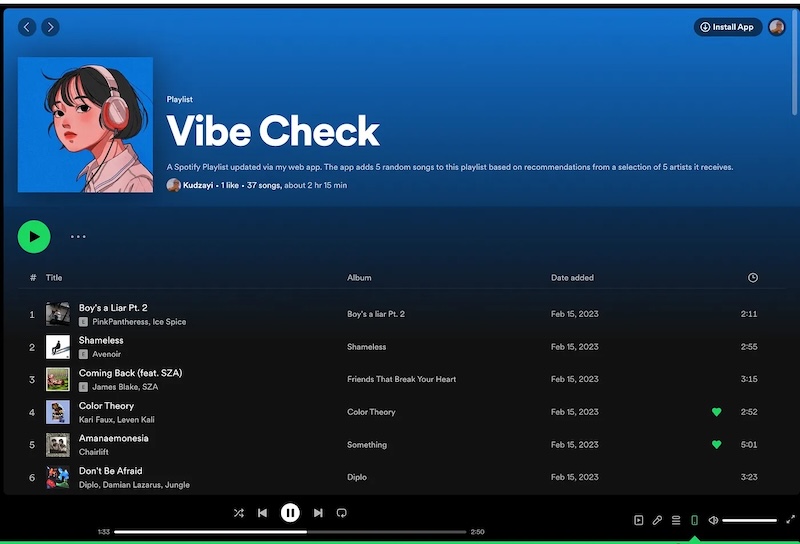
Spotify dynamic playlist (Source)
Enhancing customer experience through AI chatbots and virtual assistants: AI chatbots create frictionless support experiences, answering questions and guiding users to solutions 24/7.
Conclusion: The Future of CRO is AI-Driven
As businesses and customers strive for better customer experiences, AI appears to be an invaluable tool. It allows brands to move beyond basic metrics and dive deep into real-time data, predicting customer behavior, performing automated data analysis, personalizing content, and optimizing every touchpoint on a website.
The ability to adapt in real-time, automate complex processes, and tailor experiences for each user isn’t just a luxury anymore—it’s an expectation.
By using AI-powered CRO tools, businesses have a better chance at analyzing user data more deeply than ever before, leading to a personalized customer journey and tailored marketing strategy. This leads to AI conversion rate optimization and the creation of meaningful connections with customers. The future is clear: as AI technology evolves, so too will the possibilities for creating more personalized, engaging, and optimized experiences for every user who visits your site.

